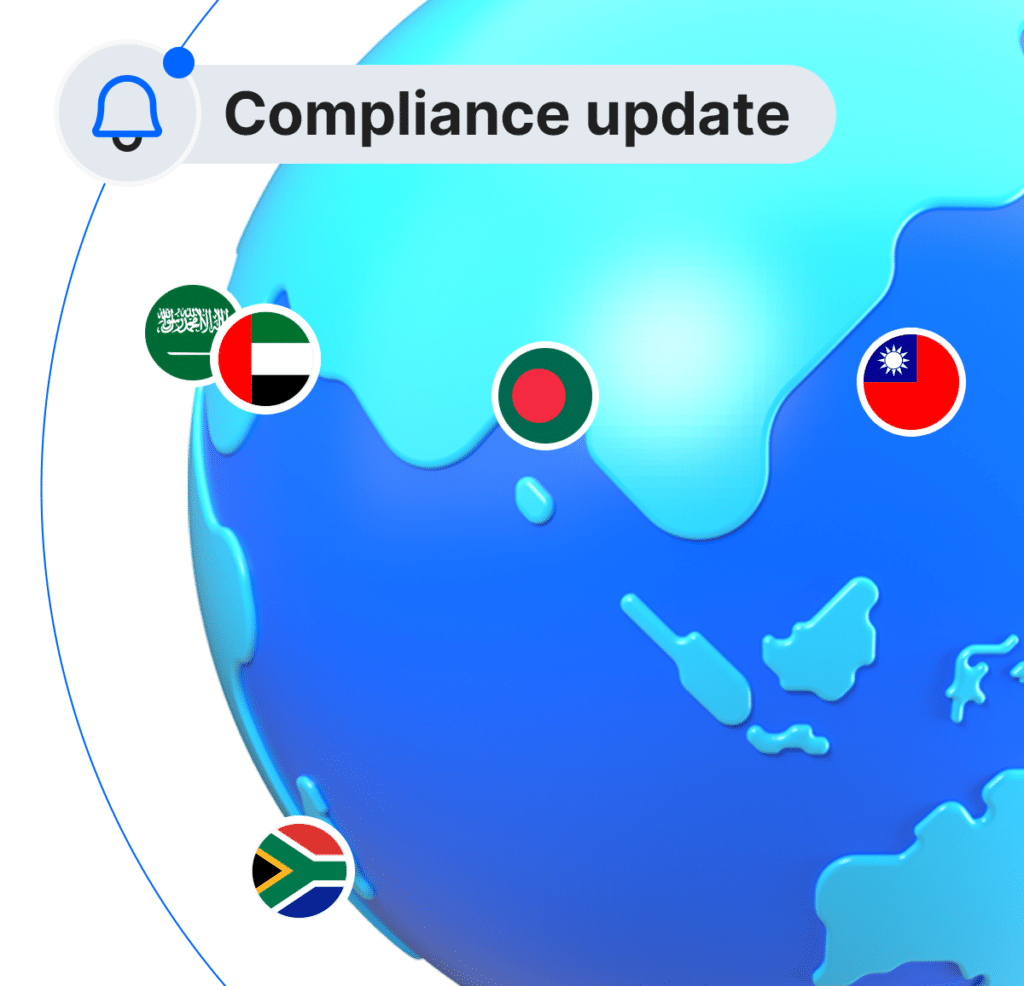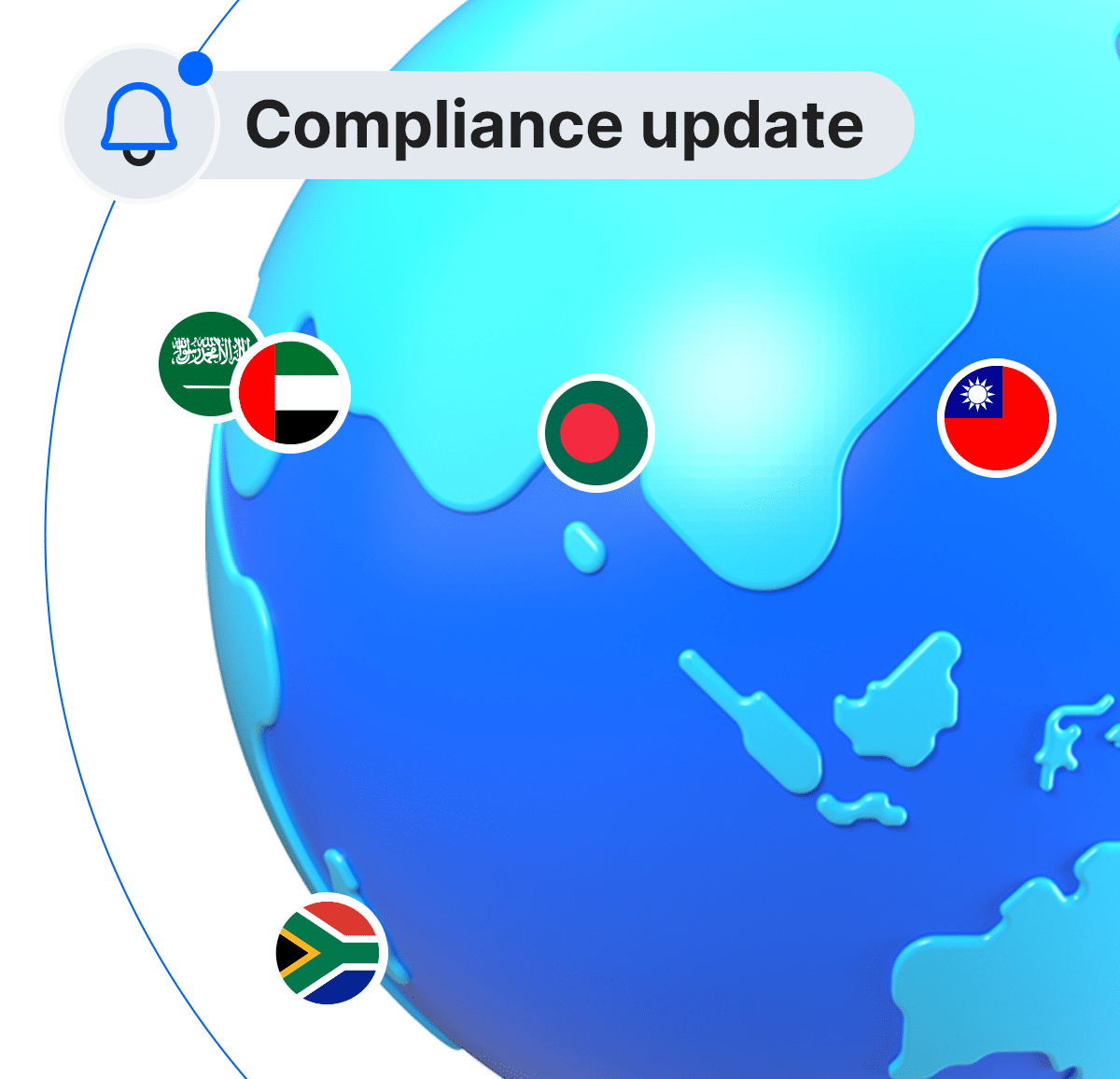Virtually every month of the year, there are regulatory changes in payroll and employment laws somewhere in the world, whether it’s updates to minimum wage rates, changes to payroll tax and social security thresholds, or new employee benefits and entitlements.
If your organization operates in multiple jurisdictions globally, then keeping track of all these compliance requirements is essential for efficient global payroll management, tax compliance and to meet the expectations of your international workforce. We know that staying on top of all this can be difficult, and CloudPay are here to provide the expertise needed to run payroll globally.
We’re constantly refreshing our library of around 90 country payroll guides with the latest compliance updates and tax laws information. But to keep you right up to date, we’ve summarized the newest changes that have just been introduced or are coming up in the near future.
Saudi Arabia: Modernization continues at pace
Saudi Arabia’s transition towards a more global-focused business environment is moving at speed, and as a result, many of its rules and regulations are aligning closer to those you’d find in established developed economies.
From a business perspective, the process of making foreign investment has been simplified. The list of industries restricted to Saudi businesses has been drastically shortened, and incoming enterprises no longer need to obtain an investment license from the Saudi authorities.
Employers now have the choice of paying overtime pay at 150% of normal rate, or providing 1.5 hours off in lieu for every hour of overtime worked. Social insurance contributions are continuing to increase each July (now 9.5% each for employers and employees), and a new retirement age system means different employees will retire at different ages between 60 and 65.
Read our full Saudi Arabia Payroll Guide here, just updated.
UAE: More rights for employees
Similar to Saudi Arabia, employees in the United Arab Emirates are getting more rights and benefits all the time.
In 2025, these include a new legal requirement for employers to provide healthcare insurance as benefits to all employees. Also, pregnant women that suffer stillbirth or a miscarriage after 23 weeks of pregnancy or more should now receive the full maternity leave entitlement that new mothers get (45 days on full pay, 15 days on half pay), expanding paid family leave provisions.
Read our full United Arab Emirates Guide here, just updated.
Taiwan: Older workers protected
New legislation in 2025 has brought in greater protection for older workers in Taiwan. If an employee reaches the official retirement age of 65, they can continue working if both they and their employer agree. Additionally, stiff fines of up to TWD$1.5 million (approx. £37,100; $50,000; €43,100) have been introduced for giving older workers lower pay or lesser working conditions compared to others.
The minimum wage has risen to TWD$28,590 per month (approx. £710; $950; €820) and TWD$190 per hour (approx. £4.70; $6.30; €5.45), and there have also been some minor revisions to social security contributions.
Read our full Taiwan Payroll Guide here, just updated.
Colombia: Working hours getting shorter
Reforms to Colombia’s standing working hours are continuing as planned. The latest step took effect on July 15 2025, with the length reduced from 46 hours to 44. The final step is expected next year: on July 15 2026, the rate should come down to its final permanent level of 42 hours.
Another recent change (which took effect in February 2025) is the expansion of dismissal protections. Previously, employers couldn’t terminate the contracts of people who are pregnant, on medical leave, or are within three years of retirement, but this now also includes new or expectant fathers who have partners who are either pregnant or on maternity leave.
Read our full Colombia Payroll Guide here, just updated.
Japan: Remote working options for parents
Major changes to employment rights for new parents in Japan will take effect in October 2025. For example, employers are being urged to provide more remote working for parents with children under three.
But parents with children who have reached their third birthday will gain from new rights up until they start school. There are five benefits available: flexible working hours, shortened working hours, additional childcare leave, childcare facilities onsite or a minimum of ten days a month of remote working. Employers will be legally required to provide at least two of these.
Read our full Japan Payroll Guide here, just updated.
South Africa: Big foreign worker changes on the horizon
There have long been discussions around foreign and migrant workers in South Africa, but political movements mean that legislation could be on the way.
A National Labor Migration Policy whitepaper was approved by the South African government in May, and has set out several proposed new laws. These include industries like hospitality, agriculture, tourism and construction having foreign labor quotas imposed, with exemptions when certain skills are in short supply. There may also be restrictions in some industries on the granting of business visas for foreign-owned small businesses.
Nothing has been confirmed in law at the time of writing, but it’s a development that organizations operating in sectors such as hospitality, agriculture, tourism and construction (amongst others) should monitor closely.
Read our full South Africa Payroll Guide here, just updated.
Bangladesh: Minimum wage remains a hot topic
The issue of minimum wage for Bangladesh’s large garment industry is still very sensitive. After violent protests towards the end of 2023, following what was viewed as an insufficient increase, there was a further 9% increase for garment workers in December 2024. Future increases and developments in this area can’t be ruled out, requiring constant attention from payroll management teams.
Read our full Bangladesh Payroll Guide here, just updated.
Tunisia: New income tax thresholds
An overhaul of income tax thresholds in Tunisia took effect at the start of 2025, which has reduced the tax burden on lower earners and increased it for those on higher salaries.
The previous 0% rate on the first TND 5,000 earned per year remains in place (approx. £1,290; $1,740; €1,490). But beyond this, the previous four-band setup has been replaced by seven bands: the previous highest band was 35%, but the new top band is 40%, applicable to all earnings over TND 70,000 per year (approx. £18,000; $24,300; €20,800).
At the same time, minimum wages were raised to TND 528.32 per month (approx. £135; $185; €155) for workers on a 48-hour week, and TND 448.24 per month (approx. £115; $155; €135) for those on a 40-hour week.
Read our new Tunisia Payroll Guide here.
Table of Contents
- Saudi Arabia: Modernization continues at pace
- UAE: More rights for employees
- Taiwan: Older workers protected
- Colombia: Working hours getting shorter
- Japan: Remote working options for parents
- South Africa: Big foreign worker changes on the horizon
- Bangladesh: Minimum wage remains a hot topic
- Tunisia: New income tax thresholds
- Constantly evolving payroll compliance
- Constantly evolving payroll compliance






